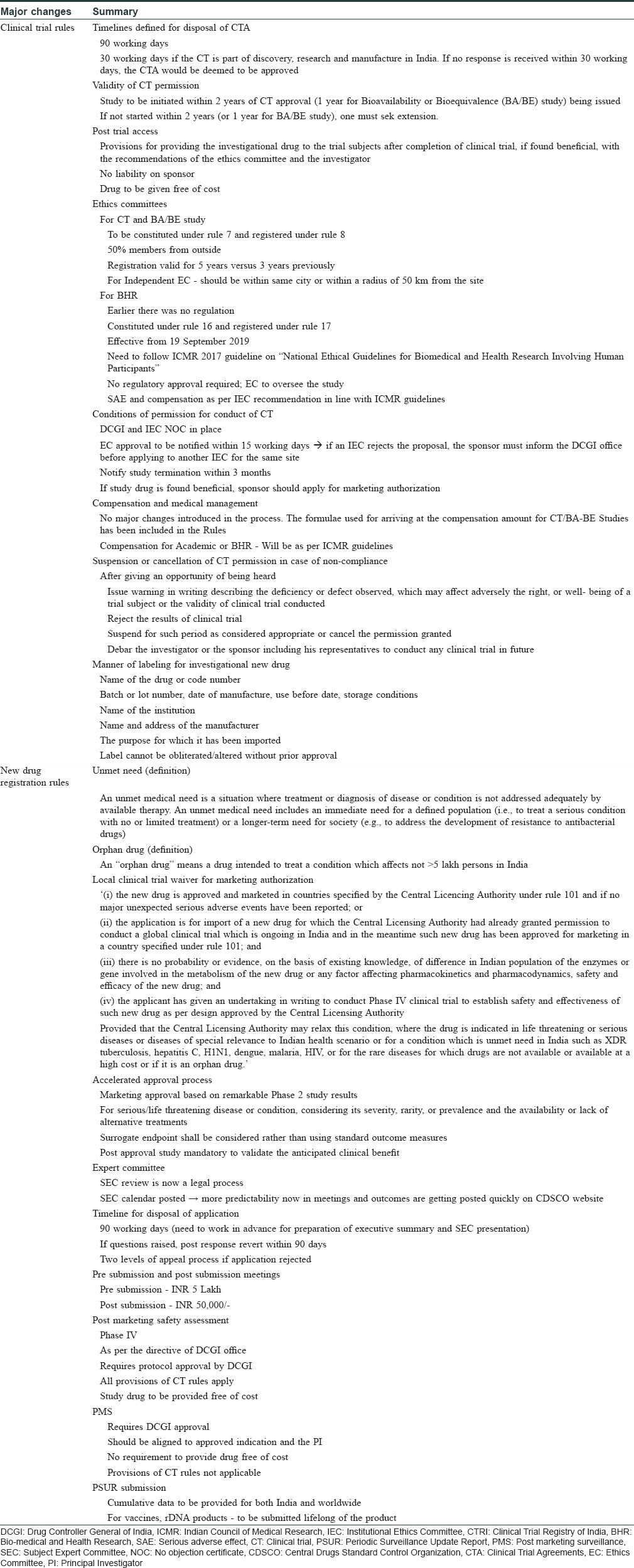Translate this page into:
New Drugs and Clinical Trials Rules-2019: What academicians need to know
2 Junior Resident (Pharmacology), Institute of Postgraduate Medical Education and Research (IPGMER), Kolkata, West Bengal, India
3 Senior Resident (Pharmacology), Diamond Harbor Govt. Medical College and Hospital, Kolkata, West Bengal, India
Correspondence Address:
Sandeep Lahiry
83/10, RBC Road, Kolkata - 700 124, West Bengal
India
| How to cite this article: Lahiry S, Thakur S, Chakraborty DS. New Drugs and Clinical Trials Rules-2019: What academicians need to know. Indian J Dermatol Venereol Leprol 2020;86:445-448 |
Sir,
The New Drugs and Clinical Trials Rules 2019, released by the Central Drugs Standard Control Organization (CDSCO), Ministry of Health and Family Welfare (MOH & FW), Government of India, became effective from March 25, 2019, except Chapter 4 (Ethics Committee for Biomedical and Health Research), which became effective after 180 days (i.e. Sep 21, 2019).[1] The new rules (Rule 97 (Rule 122DAA)) supersede existing Part XA and Schedule Y of Drugs and Cosmetics Rules, 1945. However, all existing licenses, orders and directions will remain valid.
These rules shall apply to clinical trials, bioavailability or bioequivalence (BA/BE) studies of new drugs and regulation of ethical committees approving them. The primary objectives of the new rules are:
- Promotion of research and development in India
- Faster accessibility to new drugs
- Predictability and transparency in approval process
- Improvement data credibility and accuracy.
[Table - 1] highlights major changes in the new rules. Some of the key changes are given below:

- For the first time, orphan drug has been defined as one intended to treat a condition affecting less than five lakh people in India. Clinical trial fee has been waived off for such drugs along with the provision of fast-track approval
- To promote indigenous drug development, the timelines of approval process has been defined as 30 days. If no objection/query is raised by the CDSCO, the application will be considered “approved”
- Provision of post-trial access has been made for patients if the new drug is deemed effective without any alternative. This will be provided free of cost by the sponsor.
- It is now clarified that any type of study involving human subjects, except drug trials (as defined in clause J), will be governed by the National Ethical Guidelines for Biomedical and Health Research Involving Human Participants, 2017 formulated by the Indian Council of Medical Research (ICMR).[2] Compensation for any study-related serious adverse events will be decided by the Institutional Ethics Committee (IEC)
- CDSCO registration is now mandatory for all IECs to approve regulatory clinical trials. However, accreditation by National Accreditation Board for Hospitals and Healthcare Providers – Quality Council of India (NABH–QCI) is not mandatory, although recommended. For approving non-regulatory trials, all IECs, should be registered with Department of Health Research (MOH & FW).
These new rules are expected to streamline processes for conducting clinical research in India. Provisions like longer renewal period for IEC registrations and waiver of local clinical studies are a welcome step. However, clarification is required regarding provisions like bridging trials for ethnically diverse subject population and regulatory role of the Drug Controller General of India (DCGI), if any, in areas like biomedical and health research, formation of IEC or compensation clauses.
Financial support and sponsorship
Nil.
Conflicts of interest
There are no conflicts of interest.
| 1. |
Central Drugs Standard Control Organization. Drug and Clinical Trial Rules. New Delhi: Central Drugs Standard Control Organization; 2019. Available from: https://cdsco.gov.in/opencms/opencms/system/modules/CDSCO.WEB/elements/download_file_division.jsp?num_id=NDI2MQ==. [Last accessed on 2019 Sep 12].
[Google Scholar]
|
| 2. |
ICMR. National Ethical Guidelines for Biomedical and Health Research Involving Human Participants. New Delhi: ICMR; 2017. Available from: https://www.icmr.nic.in/sites/default/files/guidelines/ICMR_Ethical_Guidelines_2017.pdf. [Last accessed on 2019 Sep 12].
[Google Scholar]
|
Fulltext Views
6,355
PDF downloads
2,345





